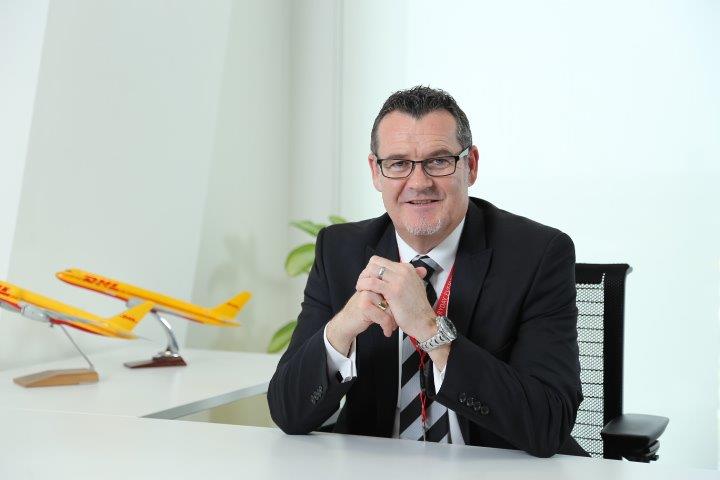Geoff Walsh, senior vice president and UAE country manager, DHL Express, highlights the importance of good customer service to maintain leadership in the regional logistics market.
How has been the performance of DHL Express regionally in the first quarter of 2017?
During the first quarter of 2017, we have witnessed positive growth across the Middle East and we are expecting this to continue throughout the remainder of the year. Generally speaking, there has been a positive sentiment across
the various industries and the economy seems to be gaining traction once again. Globally, 2016 was a good year for our parent company, DPDHL, as revenues rose to $64bn (57bn), with DHL Express having a strong contribution
to this amount.
Has the average price increase in the UAE affected the companys business in any way?
Fuel prices are always fluctuating according to the market price and that is obviously accounted for in our prices via a surcharge mechanism. DHL has a transparent process by linking fuel price changes to an index that is available to the public. The fuel surcharge is linked to the monthly average of the daily mid-spot price for a gallon of kerosene type jet fuel (US Gulf Coast). Overall, the fuel surcharges do not have a significant impact on our overall prices or volumes.
What trends are emerging in the regional logistics market in 2017?
The region is continuing to see steady growth during 2017 in the logistics market which is partially to do with the continued support for the Expo 2020, the UAEs 2021 vision, and the 2030 industrial plans which are in place.
Late last year, we also witnessed the launch of the first Authorized Economic Operator (AEO) program in the region right here in the UAE. This makes the UAE one of the 63 countries worldwide that facilitate trade and customs and supply chains. Only a handful of companies have been chosen by the UAE government to represent certified economic operators, and DHL Express is the first and only logistics provider in the UAE to be chosen and
certified. This certification means that we are recognised by customs as a trusted supplier and transportation company, and that the government views us as a market leader.
With regards to the rest of the Middle East and North Africa (MENA) region, we also expect the logistics industry to expand and grow, thanks to the various initiatives in Saudi Arabia with the futuristic Vision 2030 and the Egypt 2030 economic vision to support businesses and the countrys overall economy. We are also seeing a large development in new technologies being introduced to the logistics industry. Five trends that we believe will
shape the logistics industry over the short-, medium-, and long-term are unmanned aerial vehicles (UAV), low-cost sensors, big data, e-commerce, and self-driving vehicles.
In what ways are you going to expand your network in the region in 2017?
DHL Express was the first express logistics provider with over 40 years in the UAE and the wider MENA region. Since then, we have mirrored the regions growth and continue to invest in our facilities and capabilities to make sure that we remain the undisputed market leaders. We are currently underway to finish off our expansion in the Dubai hub, which is located in Terminal 2 and is a $17mn investment. This will increase our build space to over
7,000 sqm and enhance our capacity to handle more than 5,000 shipments an hour. It will feature a consolidated export; transit and import operations facility with on-site customs clearance; and bond hold area feeding intercontinental and region-wide air- and land-network distribution.
The facility will also include an automated conveyor system with in-line dual-view X-ray screening of parcels and pallets and more than 170 cameras spread across the facility. On a regional level, we have just inaugurated
our new SAR100mn ground and airside operation facility in Jeddah located in King Abdulaziz International Airport, which also features state-of-the-art clearance capabilities to cater for the entire western region. The expansions in Jeddah and the UAE will positively affect many regions and countries around the world.
Which is your strongest performing market in the region and why?
At DHL, we operate in more than 220 countries as one connected network and that is one of our key strengths, which means every country plays a vital role in making the network succeed. The MENA region, overall, is very
important for DHL Express as it is continuously growing and maturing. The region has a lot of potential and opportunities for development and that is why we continue to invest in our capabilities and facilities across the Middle East.
What kind of stiff competition does DHL Express face from other big names in the market?
At DHL, we strive to offer our customers the best service possible and be ccustomer-centric in everything that we do. One way to differentiate ourselves is through service leadership to achieve customer loyalty. That is why, we are
constantly in a state of innovation and creation to be able to meet future customer demands and cope with the changing logistical trends and expectations. We are always looking for new ways to provide easy access to global markets with cost-efficient and flexible logistics solutions, while ensuring clients have complete control and visibility across their supply chain.
The logistics industry is a fast-moving sector with many challenges, however, we always make sure that we are close to our customers and provide the highest-quality service, which always starts with our people being motivated
and engaged. This allows us to remain the market leaders across the region.




